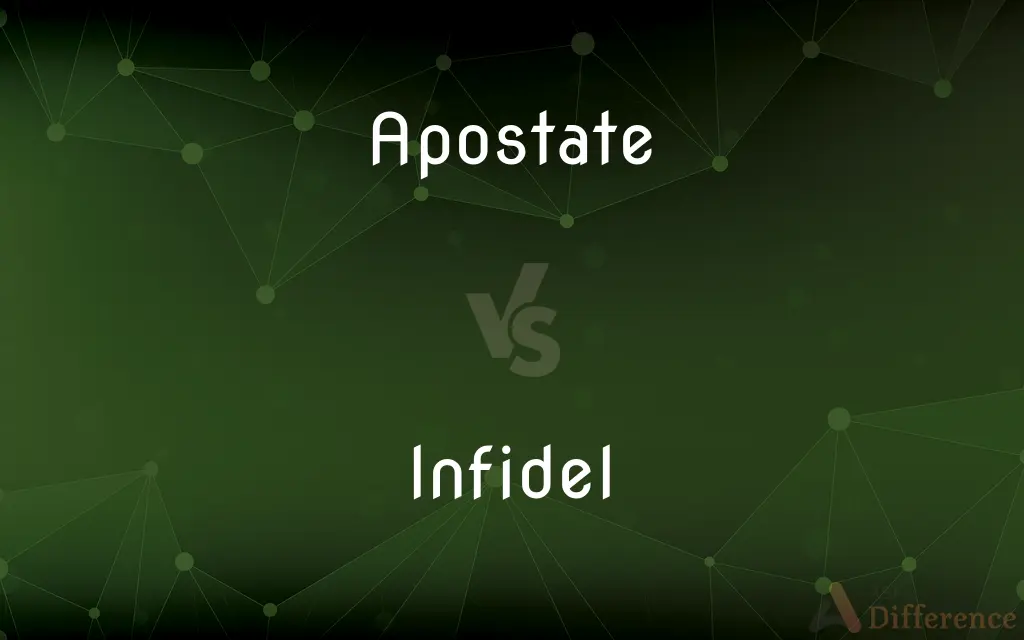Apostate vs. Infidel — What's the Difference?
Edited by Tayyaba Rehman — By Urooj Arif — Updated on April 9, 2024
An apostate is someone who renounces religious or political belief or principle, emphasizing departure from one's previous faith, whereas infidel is person who does not accept particular faith, especially from the perspective of those within faith.

Difference Between Apostate and Infidel
Table of Contents
ADVERTISEMENT
Key Differences
An apostate refers to a person who has abandoned a religious faith, a political party, a cause, or a principle that they previously adhered to. This term underscores a significant shift or departure from a set of beliefs or affiliations that were once held dear. For instance, someone who was once an active member of a religious community but who has since rejected those beliefs would be considered an apostate. On the other hand, an infidel is someone who does not believe in a specific religion or ideology, especially as viewed by those who do. The term often carries a connotation of otherness, used by members of a religious group to describe those outside their community, without implying any previous adherence or affiliation.
While apostasy involves an active decision to leave or renounce a belief system, the concept of being an infidel is more passive, concerning one's current state of belief rather than a change from a previous belief. An apostate's actions are characterized by the rejection or denunciation of their former beliefs, highlighting a transformation or transition. In contrast, being labeled an infidel reflects a lack of acceptance or recognition by others within a specific belief system and does not necessarily involve any change in personal belief or affiliation.
The term apostate is used primarily within the context of religion but can also extend to political or philosophical beliefs, indicating a broader application. It implies a personal journey or evolution in thought, belief, or allegiance. Meanwhile, infidel is almost exclusively used in religious contexts to signify someone outside the faith, often without considering the individual's personal journey or the nuances of their beliefs.
Apostasy is often viewed within communities as a betrayal or a significant loss, with apostates sometimes facing social stigma or penalties for their decision to leave the faith. This perspective underscores the perceived seriousness of the act of apostasy. In contrast, the term infidel is used to delineate between those who are within the religious community and those who are outside it, often without the same level of personal betrayal or loss, but with potential implications of exclusion or otherness.
The distinction between an apostate and an infidel highlights the complex dynamics of belief, belonging, and identity within and outside religious and ideological communities. While an apostate's identity is marked by their departure from a previously held belief system, an infidel's identity is characterized by their position as an outsider to the belief system, as defined by those within it.
ADVERTISEMENT
Comparison Chart
Definition
Someone who renounces a religious or political belief
Someone who does not accept a particular faith
Connotation
Emphasizes departure from previously held beliefs
Suggests otherness or exclusion by a faith
Context
Can apply to religion, politics, or philosophy
Primarily used in religious contexts
Implication of Change
Involves an active decision and change
Passive; based on current state of belief
Perspective on Identity
Marked by transformation or transition
Defined by external perception within a faith
Social Implication
Can involve stigma or penalties within the original community
Often implies exclusion without personal betrayal
Compare with Definitions
Apostate
Indicates a significant shift in allegiance.
His apostasy from traditional beliefs shocked his community.
Infidel
Reflects an external judgment of belief.
The book explores the historical treatment of infidels.
Apostate
A person who renounces a previously held belief or faith.
After years of reflection, he became an apostate from the church.
Infidel
A person not accepting a specific faith, especially as defined by that faith.
To the devout, anyone outside the religion was considered an infidel.
Apostate
Someone who rejects what they once advocated.
He wrote extensively about his journey as an apostate.
Infidel
Indicates a lack of adherence to the dominant faith.
Infidels were often excluded from social and political life.
Apostate
Someone who abandons a cause or principle.
She was considered an apostate for leaving the political movement.
Infidel
Suggests otherness from a religious perspective.
In his travels, he was often treated as an infidel.
Apostate
Implies a betrayal or departure from a group's norms.
As an apostate, he faced considerable social stigma.
Infidel
Used to describe someone perceived as a religious outsider.
The term 'infidel' has been historically used to justify conflicts.
Apostate
A person who renounces a religious or political belief or principle
After fifty years as an apostate he returned to the faith
Infidel
Infidel (literally "unfaithful") is a term used in certain religions for those accused of unbelief in the central tenets of their own religion, for members of another religion, or for the irreligious.Infidel is an ecclesiastical term in Christianity around which the Church developed a body of theology that deals with the concept of infidelity, which makes a clear differentiation between those who were baptized and followed the teachings of the Church versus those who are outside the faith. The term infidel was used by Christians to describe those perceived as the enemies of Christianity.
Apostate
Abandoning a religious or political belief or principle
An apostate Roman Catholic
Infidel
A person who has no religion or whose religion is not that of the majority
A crusade against infidels and heretics
Apostate
One who has abandoned one's religious faith, a political party, one's principles, or a cause.
Infidel
Adhering to a religion other than that of the majority
The infidel foe
Apostate
Guilty of apostasy.
We must punish this apostate priest.
Infidel
Often Offensive An unbeliever with respect to a particular religion, especially Christianity or Islam.
Apostate
A person who has renounced a religion or faith.
Infidel
One who has no religious beliefs.
Apostate
(Roman Catholicism) One who, after having received sacred orders, renounces his clerical profession.
Infidel
One who doubts or rejects a particular doctrine, system, or principle.
Apostate
One who has forsaken the faith, principles, or party, to which he before adhered; esp., one who has forsaken his religion for another; a pervert; a renegade.
Infidel
Rejecting a specific religion.
Apostate
One who, after having received sacred orders, renounces his clerical profession.
Infidel
Of, characteristic of, or relating to unbelievers or unbelief.
Apostate
Pertaining to, or characterized by, apostasy; faithless to moral allegiance; renegade.
So spake the apostate angel.
A wretched and apostate state.
Infidel
One who does not believe in a certain religion.
Apostate
To apostatize.
We are not of them which apostate from Christ.
Infidel
One who does not believe in a certain principle.
Apostate
A disloyal person who betrays or deserts his cause or religion or political party or friend etc.
Infidel
One with no religious beliefs.
Apostate
Not faithful to religion or party or cause
Infidel
Not holding the faith; - applied by Christians to one who does not believe in the inspiration of the Scriptures, and the supernatural origin of Christianity; used by Mohammedans to refer to those who do not believe in Islam.
The infidel writer is a great enemy to society.
Infidel
One who does not believe in the prevailing religious faith; a heathen; a freethinker; - used especially by Christians and Mohammedans.
Infidel
A person who does not acknowledge your God
Common Curiosities
What is the main difference between an apostate and an infidel?
The main difference is that an apostate has renounced their previously held beliefs, while an infidel does not adhere to the faith from the perspective of those within it.
Does becoming an apostate always involve a public declaration?
Not necessarily; apostasy can be a private decision, though public actions or declarations might follow.
Is the term infidel always derogatory?
While often used pejoratively, the context and intent behind its use can vary significantly.
Are there legal consequences for apostasy in some countries?
Yes, in some countries, apostasy can have legal consequences, including penalties or restrictions.
Can someone be born an infidel?
From the perspective of a religious community, someone outside the faith, including by birth, can be considered an infidel.
How do communities typically respond to apostates?
Responses can range from social stigma and isolation to more severe penalties, depending on the community.
How does one's community influence the labels of apostate or infidel?
A person's community significantly influences these labels, determining the criteria and significance of being an apostate or infidel.
Can an apostate become an infidel?
Yes, from the perspective of their former community, an apostate may be viewed as an infidel after renouncing the faith.
Do all religions have concepts of apostasy and infidelity?
Most religions have concepts or terms that describe leaving the faith (apostasy) and being outside the faith (infidelity), though the specifics and terminology can vary.
Does the concept of apostasy imply a negative judgment?
While not inherently negative, apostasy often carries a negative connotation within the community from which one departs.
Why is the term infidel primarily associated with religion?
It originates from historical religious contexts where defining insiders versus outsiders was crucial to community identity.
Is being labeled an infidel subjective?
Yes, it depends on the perspective of the faith group labeling someone as an infidel.
Can the term apostate apply to non-religious contexts?
Yes, it can apply to political, philosophical, or other ideological contexts.
Share Your Discovery

Previous Comparison
Eww vs. Ew
Next Comparison
Drain vs. CulvertAuthor Spotlight
Written by
Urooj ArifUrooj is a skilled content writer at Ask Difference, known for her exceptional ability to simplify complex topics into engaging and informative content. With a passion for research and a flair for clear, concise writing, she consistently delivers articles that resonate with our diverse audience.
Edited by
Tayyaba RehmanTayyaba Rehman is a distinguished writer, currently serving as a primary contributor to askdifference.com. As a researcher in semantics and etymology, Tayyaba's passion for the complexity of languages and their distinctions has found a perfect home on the platform. Tayyaba delves into the intricacies of language, distinguishing between commonly confused words and phrases, thereby providing clarity for readers worldwide.
















































